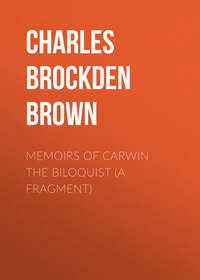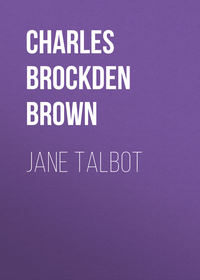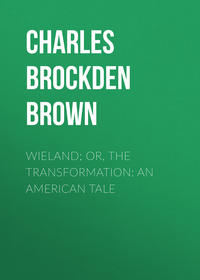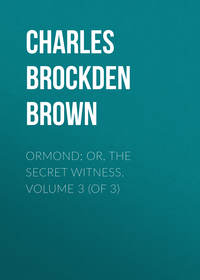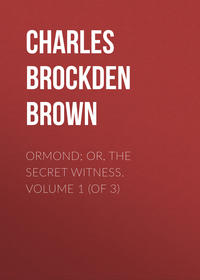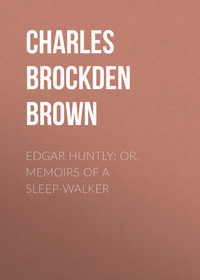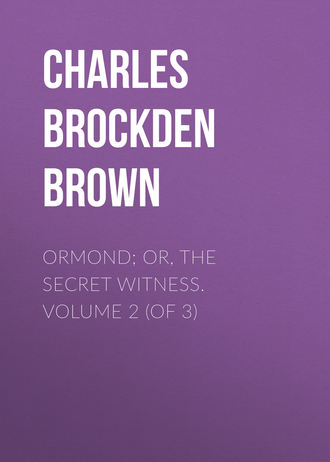 полная версия
полная версияOrmond; Or, The Secret Witness. Volume 2 (of 3)
These words were uttered without any extenuating hesitation or depression of tone. On the contrary, the most offensive terms were drawn out in the most deliberate and emphatic manner. Constantia's cheeks glowed, and her eyes sparkled with indignation, but she forbore to interrupt. The looks with which she listened to the remainder of the speech showed that she fully comprehended the scene, and enabled him to comprehend it. He proceeded: —
"This man is a brother of that. Their resemblance in figure occasioned your mistake. Your father's debtor died, it seems, on his arrival at Jamaica. There he met with this brother, and bequeathed to him his property and papers. Some of these papers are in my possession. They are letters from Constantia Dudley, and are parts of an intrigue, which, considering the character of the man, was not much to her honour. Such was this man's narrative told to me some time before your meeting with him at his house. I have right to judge in this affair; that is, I have a right to my opinion. If I mistake, (and I half suspect myself,) you are able, perhaps, to rectify my error; and in a case like this doubtless you will not want the inclination."
Perhaps if the countenance of this man had not been characterized by the keenest intelligence, and a sort of careless and overflowing good-will, this speech might have produced different effects. She was prepared, though imperfectly, for entering into his character. He waited for an answer, which she gave without emotion: —
"You were deceived. I am sorry for your own sake that you are. He must have had some end in view, in imposing these falsehoods upon you, which perhaps they have enabled him to accomplish. As to myself, this man can do me no injury. I willingly make you my judge. The letters you speak of will alone suffice to my vindication. They never were received from me, and are forgeries. That man always persisted till he made himself the dupe of his own artifices. That incident in his plot, on the introduction of which he probably the most applauded himself, will most powerfully operate to defeat it.
"Those letters never were received from me, and are forgeries. His skill in imitation extended no farther in the present case than my handwriting. My model of thinking and expression were beyond the reach of his mimicry."
When she had finished, Osmond spent a moment in ruminating. "I perceive you are right," said he. "I suppose he has purloined from me two hundred guineas, which I entrusted to his fidelity. And yet I received a letter; but that may likewise be a forgery. By my soul," continued he, in a tone that had more of satisfaction than disappointment in it, "this fellow was an adept at his trade. I do not repine. I have bought the exhibition at a cheap rate. The pains that he took did not merit a less recompense. I am glad that he was contented with so little. Had he persisted he might have raised the price far above its value. 'Twill be lamentable if he receive more than he stipulated for, – if, in his last purchase, the gallows should be thrown into the bargain. May he have the wisdom to see that a halter, though not included in his terms, is only a new instance of his good fortune! But his cunning will hardly carry him thus far. His stupidity will, no doubt, prefer a lingering to a sudden exit.
"But this man and his destiny are trifles. Let us leave them to themselves. Your name is Constantia. 'Twas given you, I suppose, that you might be known by it. Pr'ythee, Constantia was this the only purpose that brought you hither? If it were, it has received as ample a discussion as it merits. You came for this end, but will remain, I hope, for a better one. Haying dismissed Craig and his plots, let us now talk of each other."
"I confess," said the lady, with an hesitation she could not subdue, "this was not my only purpose. One much more important has produced this visit."
"Indeed! pray let me know it. I am glad that so trivial an object as Craig did not occupy the first place in your thoughts. Proceed, I beseech you."
"It is a subject on which I cannot enter without hesitation, – a hesitation unworthy of me."
"Stop," cried Ormond, rising and touching the bell; "nothing like time to make a conquest of embarrassment. We will defer this conference six minutes, just while we eat our dinner."
At the same moment a servant entered, with two plates and the usual apparatus for dinner. On seeing this she rose, in some hurry, to depart: – "I thought, sir, you were disengaged? I call at some other hour."
He seized her hand, and held her from going, but with an air by no means disrespectful. "Nay," said he, "what is it that scares you away? Are you terrified at the mention of victuals? You must have fasted long when it comes to that. I told you true. I am disengaged, but not from the obligation of eating and drinking. No doubt you have dined. No reason why I should go without my dinner. If you do not choose to partake with me, so much the better. Your temperance ought to dispense with two meals in an hour. Be a looker-on; or, if that will not do, retire into my library, where in six minutes, I will be with you, and lend you my aid in the arduous task of telling me what you came with an intention of telling."
This singular address disconcerted and abashed her. She was contented to follow the servant silently into an adjoining apartment. Here she reflected with no small surprise on the behaviour of this man. Though ruffled, she was not heartily displeased with it. She had scarcely time to collect herself, when he entered. He immediately seated her, and himself opposite to her. He fixed his eyes without scruple on her face. His gaze was steadfast, but not insolent or oppressive. He surveyed her with the looks with which he would have eyed a charming portrait. His attention was occupied with what he saw, as that of an artist is occupied when viewing a madonna of Rafaello. At length he broke silence: —
"At dinner I was busy in thinking what it was you had to disclose. I will not fatigue you with my guesses. They would he impertinent, as long as the truth is going to be disclosed." He paused, and then continued: – "But I see you cannot dispense with my aid. Perhaps your business relates to Helena. She has done wrong, and you wish me to rebuke the girl."
Constantia profited by this opening, and said, "Yes, she has done wrong. It is true my business relates to her. I came hither as a suppliant in her behalf. Will you not assist her in recovering the path from which she has deviated? She left it from confiding more in the judgement of her guide than her own. There is one method of repairing the evil. It lies with you to repair that evil."
During this address the gaiety of Ormond disappeared. He fixed his eyes on Constantia with new and even pathetic earnestness. "I guessed as much," said he. I have often been deceived in my judgement of characters. Perhaps I do not comprehend yours. Yet it is not little that I have heard respecting you. Something I have seen. I begin to suspect a material error in my theory of human nature. Happy will it be for Helena if my suspicions be groundless.
"You are Helena's friend. Be mine also, and advise me. Shall I marry this girl or not? You know on what terms we live. Are they suitable to our respective characters? Shall I wed this girl, or shall things remain as they are?
"I have an irreconcilable aversion to a sad brow and a sick bed. Helena is grieved, because her neighbours sneer and point at her. So far she is a fool; but that is a folly of which she never will be cured. Marriage, it seems, will set all right. Answer me, Constantia, shall I marry?"
There was something in the tone, but more in the tenor of this address that startled her. There was nothing in this man but what came upon her unaware. This sudden effusion of confidence was particularly unexpected and embarrassing. She scarcely knew whether to regard it as serious or a jest. On observing her indisposed to speak, he continued: —
"Away with these impertinent circuities and scruples. I know your meaning. Why should I pretend ignorance, and put you to the trouble of explanation? You came hither with no other view than to exact this question, and furnish an answer. Why should not we come at once to the point? I have for some time been dubious on this head. There is something wanting to determine the balance. If you have that something, throw it into the proper scale.
"You err if you think this manner of addressing you is wild or improper. This girl is the subject of discourse. If she was not to be so, why did you favour me with this visit? You have sought me, and introduced yourself. I have, in like manner, overlooked ordinary forms, – a negligence that has been systematic with me, but, in the present case, particularly justifiable by your example. Shame upon you, presumptuous girl, to suppose yourself the only rational being among mankind. And yet, if you thought so, why did you thus unceremoniously intrude upon my retirements? This act is of a piece with the rest. It shows you to be one whose existence I did not believe possible.
"Take care. You know not what you have done. You came hither as Helena's friend. Perhaps time may show that in this visit you have performed the behest of her bitterest enemy. But that is out of season. This girl is our mutual property. You are her friend; I am her lover. Her happiness is precious in my eyes and in yours. To the rest of mankind she is a noisome weed that cannot be shunned too cautiously, nor trampled on too much. If we forsake her, infamy, that is now kept at bay, will seize upon her, and, while it mangles her form, will tear from her her innocence. She has no arms with which to contend against that foe. Marriage will place her at once in security. Shall it be? You have an exact knowledge of her strength and her weakness. Of me you know little. Perhaps, before that question can be satisfactorily answered, it is requisite to know the qualities of her husband. Be my character henceforth the subject of your study. I will furnish you with all the light in my power. Be not hasty in deciding; but, when your decision is formed, let me know it." He waited for an answer, which she, at length, summoned resolution enough to give: —
"You have come to the chief point which I had in view in making this visit. To say truth, I came hither to remonstrate with you on withholding that which Helena may justly claim from you. Her happiness will be unquestionably restored, and increased by it. Yours will not be impaired. Matrimony will not produce any essential change in your situation. It will produce no greater or different intercourse than now exists. Helena is on the brink of a gulf which I shudder to look upon. I believe that you will not injure yourself by snatching her from it. I am sure that you will confer an inexpressible benefit upon her. Let me then persuade you to do her and yourself justice."
"No persuasion," said Ormond, after recovering from a fit of thoughtfulness, "is needful for this end: I only want to be convinced. You have decided, but, I fear hastily. By what inscrutable influences are our steps guided! Come, proceed in your exhortations. Argue with the utmost clearness and cogency. Arm yourself with all the irresistibles of eloquence. Yet you are building nothing. You are only demolishing. Your argument is one thing. Its tendency is another; and is the reverse of all you expect and desire. My assent will be refused with an obstinacy proportioned to the force that you exert to obtain it, and to the just application of that force."
"I see," replied the lady, smiling and leaving her seat, "you can talk in riddles, as well as other people. This visit has been too long. I shall, indeed, be sorry, if my interference, instead of serving my friend, has injured her. I have acted an uncommon, and, as it may seem, an ambiguous part. I shall be contented with construing my motives in my own way. I wish you a good evening."
"'Tis false," cried he, sternly, "you do not wish it!"
"How?" exclaimed the astonished Constantia.
"I will put your sincerity to the test. Allow me to spend this evening in your company; then it will be well spent, and I shall believe your wishes sincere. Else," continued he, changing his affected austerity into a smile, "Constantia is a liar."
"You are a singular man. I hardly know how to understand you."
"Well. Words are made to carry meanings. You shall have them in abundance. Your house is your citadel. I will not enter it without leave. Permit me to visit it when I please. But that is too much. It is more than I would allow you. When will you permit me to visit you?"
"I cannot answer when I do not understand. You clothe your thoughts in a garb so uncouth, that I know not in what light they are to be viewed."
"Well, now, I thought you understood my language, and were an Englishwoman, but I will use another. Shall I have the honour" (bowing with a courtly air of supplication) "of occasionally paying my respects to you at your own dwelling? It would be cruel to condemn those who have the happiness of knowing Miss Dudley, to fashionable restraints. At what hour will she be least incommoded by a visitant?"
"I am as little pleased with formalities," replied the lady, "as you are. My friends I cannot see too often. They need to consult merely their own convenience. Those who are not my friends I cannot see too seldom. You have only to establish your title to that name, and your welcome at all times is sure. Till then you must not look for it."
CHAPTER VI
Here ended this conference. She had by no means suspected the manner in which it would be conducted. All punctilios were trampled under foot by the impetuosity of Ormond. Things were, at once, and without delay, placed upon a certain footing. The point, which ordinary persons would have employed months in attaining, was reached in a moment. While these incidents were fresh in her memory, they were accompanied with a sort of trepidation, the offspring at once of pleasure and surprise.
Ormond had not deceived her expectations; but hearsay and personal examination, however uniform their testimony may be, produce a very different impression. In her present reflections, Helena and her lover approached to the front of the stage, and were viewed with equal perspicuity. One consequence of this was, that their characters were more powerfully contrasted with each other, and the eligibility of marriage appeared not quite so incontestable as before.
Was not equality implied in this compact? Marriage is an instrument of pleasure or pain in proportion as this equality is more or less. What but the fascination of his senses is it that ties Ormond to Helena. Is this a basis en which marriage may properly be built?
If things had not gone thus far, the impropriety of marriage could not be doubted; but, at present, there is a choice of evils, and that may now be desirable which at a former period, and in different circumstances, would have been clearly otherwise.
The evils of the present connection are known; those of marriage are future and contingent. Helena cannot be the object of a genuine and lasting passion; another may; this is not merely possible; nothing is more likely to happen. This event, therefore, ought to be included in our calculation. There would be a material deficiency without it. What was the amount of the misery that would in this case ensue?
Constantia was qualified, beyond most others, to form an adequate conception of this misery. One of the ingredients in her character was a mild and steadfast enthusiasm. Her sensibilities to social pleasure, and her conceptions of the benefits to flow from the conformity and concurrence of intentions and wishes, heightening and refining the sensual passion, were exquisite.
There, indeed, were evils, the foresight of which tended to prevent them; but was there wisdom in creating obstacles in the way of a suitable alliance. Before we act, we must consider not only the misery produced, but the happiness precluded by our measures.
In no case, perhaps, is the decision of a human being impartial, or totally uninfluenced by sinister and selfish motives. If Constantia surpassed others, it was not because her motives were pure, but because they possessed more of purity than those of others. Sinister considerations flow in upon us through imperceptible channels, and modify our thoughts in numberless ways, without our being truly conscious of their presence. Constantia was young, and her heart was open at a thousand pores, to the love of excellence. The image of Ormond occupied the chief place in her fancy, and was endowed with attractive and venerable qualities. A bias was hence created that swayed her thoughts, though she knew not that they were swayed. To this might justly be imputed some part of that reluctance which she now felt to give Ormond to Helena. But this was not sufficient to turn the scale. That which had previously mounted was indeed heavier than before; but this addition did not enable it to outweigh its opposite. Marriage was still the best upon the whole; but her heart was tortured to think that, best as it was, it abounded with so many evils.
On the evening of the next day, Ormond entered, with careless abruptness, Constantia's sitting-apartment. He was introduced to her father. A general and unrestrained conversation immediately took place. Ormond addressed Mr. Dudley with the familiarity of an old acquaintance. In three minutes, all embarrassment was discarded. The lady and her visitant were accurate observers of each other. In the remarks of the latter, (and his vein was an abundant one) there was a freedom and originality altogether new to his hearers. In his easiest and sprightliest sallies were tokens of a mind habituated to profound and extensive views. His associations were forced on a comprehensive scale.
He pretended to nothing, and studied the concealments of ambiguity more in reality than in appearance. Constantia, however, discovered a sufficient resemblance between their theories of virtue and duty. The difference between them lay in the inferences arbitrarily deduced, and in which two persons may vary without end, and yet never be repugnant. Constantia delighted her companions by the facility with which she entered into his meaning, the sagacity she displayed in drawing out his hints, circumscribing his conjectures, and thwarting or qualifying his maxims. The scene was generally replete with ardour and contention, and yet the impression left on the mind of Ormond was full of harmony. Her discourse tended to rouse him from his lethargy, to furnish him with powerful excitements; and the time spent in her company seemed like a doubling of existence.
The comparison could not but suggest itself between this scene and that exhibited by Helena. With the latter, voluptuous blandishments, musical prattle, and silent but expressive homage, composed a banquet delicious fur awhile, but whose sweetness now began to pall upon his taste. It supplied him with no new ideas, and hindered him, by the lulling sensations it inspired, from profiting by his former acquisitions. Helena was beautiful. Apply the scale, and not a member was found inelegantly disposed, or negligently moulded. Not a curve that was blemished by an angle or ruffled by asperities. The irradiations of her eyes were able to dissolve the knottiest fibres, and their azure was serene beyond any that nature had elsewhere exhibited. Over the rest of her form the glistening and rosy hues were diffused with prodigal luxuriance, and mingled in endless and wanton variety. Yet this image had fewer attractions even to the senses than that of Constantia. So great is the difference between forms animated by different degrees of intelligence.
The interviews of Ormond and Constantia grew more frequent. The progress which they made in acknowledgement of each other was rapid. Two positions, that were favourite ones with him, were quickly subverted. He was suddenly changed, from being one of the calumniators of the female sex, to one of its warmest eulogists. This was a point on which Constantia had ever been a vigorous disputant; but her arguments, in their direct tendency, would never have made a convert of this man. Their force, intrinsically considered, was nothing. He drew his conclusions from incidental circumstances. Her reasonings might be fallacious or valid, but they were composed, arranged, and delivered, were drawn from such sources, and accompanied with such illustrations, as plainly testified a manlike energy in the reasoner. In this indirect and circuitous way her point was unanswerably established.
"Your reasoning is bad," he would say: "every one of your conclusions is false. Not a single allegation but may be easily confuted; and yet I allow that your position is incontrovertibly proved by them. How bewildered is that man who never thinks for himself! who rejects a principle merely because the arguments brought in support of it are insufficient! I must not reject the truth because another has unjustifiably adopted it. I want to reach a certain hill-top. Another has reached it before me, but the ladder he used is too weak to bear me. What then? Am I to stay below on that account? No; I have only to construct one suitable to the purpose, and of strength sufficient."
A second maxim had never been confuted till now. It inculcated the insignificance and hollowness of love. No pleasure he thought was to be despised for its own sake. Every thing was good in its place, but amorous gratifications were to be degraded to the bottom of the catalogue. The enjoyments of music and landscape were of a much higher order. Epicurism itself was entitled to more respect. Love, in itself, was in his opinion of little worth, and only of importance as the source of the most terrible of intellectual maladies. Sexual sensations associating themselves, in a certain way, with our ideas, beget a disease, which has, indeed, found no place in the catalogue, but is a case of more entire subversion and confusion of mind than any other. The victim is callous to the sentiments of honour and shame, insensible to the most palpable distinctions of right and wrong, a systematic opponent of testimony and obstinate perverter of truth.
Ormond was partly right. Madness like death can be averted by no foresight or previous contrivance; This probably is one of its characteristics. He that witnesses its influence on another with most horror, and most fervently deprecates its ravages, is not therefore more safe. This circumstance was realized in the history of Ormond.
This infatuation, if it may so be called, was gradual in its progress. The sensations which Helena was now able to excite were of a new kind. Her power was not merely weakened, but her endeavours counteracted their own end. Her fondness was rejected with disdain, or borne with reluctance. The lady was not slow in perceiving this change. The stroke of death would have been more acceptable. His own reflections were too tormenting to make him willing to discuss them in words. He was not aware of the effects produced by this change in his demeanour, till informed of it by herself.
One evening he displayed symptoms of uncommon dissatisfaction. Her tenderness was unable to dispel it. He complained of want of sleep. This afforded a hint which she drew forth in one of her enchanting ditties. Habit had almost conferred upon her the power of spontaneous poesy, and, while she pressed his forehead to her bosom, she warbled forth a strain airy and exuberant in numbers, tender and ecstatic in its imagery: —
Sleep, extend thy downy pinionHasten from thy cell with speed;Spread around thy soft dominion;Much those brows thy balmy presence need.Wave thy wand of slumberous power,Moistened in Lethean dews,To charm the busy spirits of the hour,And brighten memory's malignant hues.Thy mantle, dark and starless, castOver my selected youth;Bury in thy womb the mournful past,And soften with thy dreams th' asperities of truth.The changeful hues of his impassioned sleep,My office it shall be to watch the while;With thee, my love, when fancy prompts, to weep,And when thou smil'st, to smile.But sleep! I charge thee, visit not these eyes,Nor raise thy dark pavilion here,'Till morrow from the cave of ocean arise,And whisper tuneful joy in nature's ear.But mutely let me lie, and sateless gazeAt all the soul that in his visage sits,While spirits of harmonious air —Here her voice sunk, and the line terminated in a sigh. Her museful ardours were chilled by the looks of Ormond. Absorbed in his own thoughts, he appeared scarcely to attend to this strain. His sternness was proof against her accustomed fascinations. At length she pathetically complained of his coldness, and insinuated her suspicions that his affection was transferred to another object. He started from her embrace, and after two or three turns across the room, he stood before her. His large eyes were steadfastly fixed upon her face.


